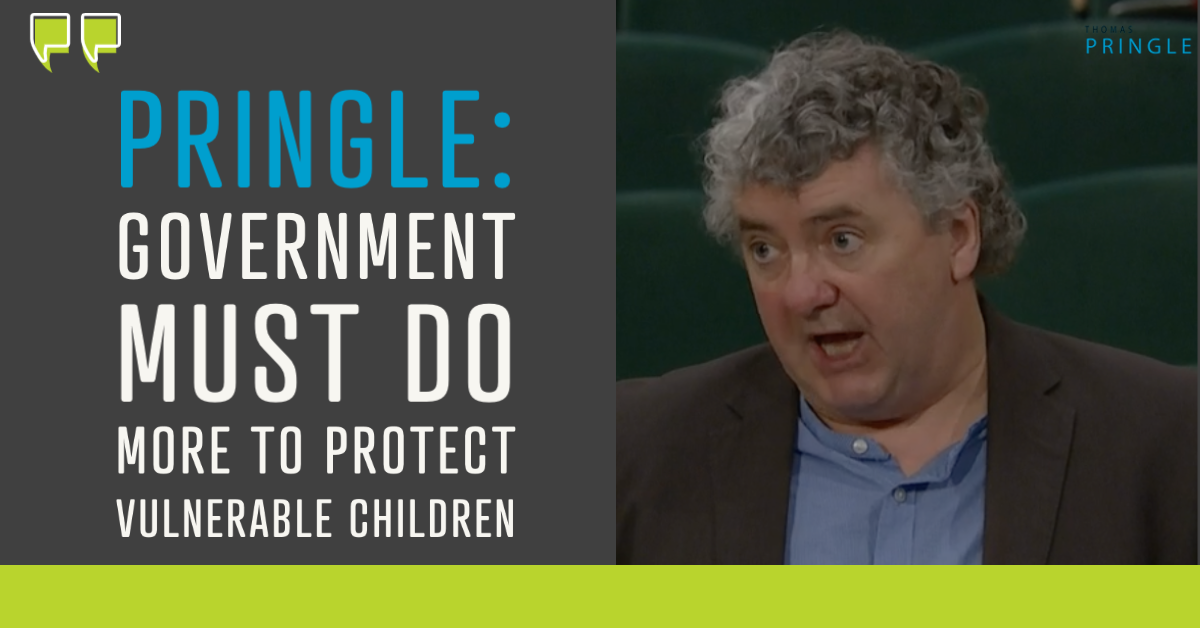- Pringle: We need a policy that recognises the importance of inshore fishing
- Pringle: Disabled people and carers face crisis of State neglect
- Pringle: Failed FF/FG housing policies forcing people to put their lives on hold
- Pringle welcomes Donegal council motion on Occupied Territories Bill: ‘We cannot stand by in the face of genocide’
Pringle: Government must do more to protect vulnerable children
- Updated: 9th April 2021

Independent TD for Donegal, Thomas Pringle, has called on the Government to do more to protect vulnerable children.
Deputy Pringle addressed the Dáil to support the Children (Amendment) Bill 2020, which would permit the identification of persons accused and convicted of homicide offenses against children and allows for the victims of those terrible crimes to be named.
Deputy Pringle said: “I know that the recent decision on the application of section 252 of the Children Act 2001 has been causing a lot of heartbreak for the families of children who have been murdered.”
He said, “We have instances where a crime is committed, a child is murdered and media outlets can report this widely, naming the child, with photos of the child, with photos and quotes of their family members, but then, once someone is convicted, the reporting changes to ‘a person was charged with the killing of a child on X date’. It really is absurd.”
Deputy Pringle said: “I welcome that the Government has moved quickly to try and remedy this issue. I cannot imagine the hurt of families and loved ones who feel like their children have been erased in all of this.”
The deputy said he also thought of other circumstances “that highlight the vital need to protect vulnerable children, and highlight the times over our history, and still today, when we have failed”.
He reminded the Dáil that the recent final report of the now-dissolved Commission of Investigation into Mother and Baby Homes found that between 1922 and 1998, 9,000 children died in Ireland’s Mother and Baby Homes.
Deputy Pringle said: “This shocking and heartbreaking figure only relates to the 12 or 14 homes that were investigated by the commission. There were hundreds such institutions and others around the country.”
Deputy Pringle also asked about the independent specialist in-depth research study on familicide and domestic homicide that the Government announced in May 2019.
He asked: “Where is this review? The website is still live but doesn’t seem to have been updated since 2019. The lockdown saw a huge increase in people accessing domestic violence helplines and Barnardos and Childline also reported increases in the number of children contacting them.”
Deputy Pringle said: “This truly is one of the most tragic topics to be discussing and legislating for. As usual, I think about the ability to prevent such crimes. Where are the early intervention services? Where are the timely, accessible and affordable mental health supports? Where are the supported accommodation options for families trying to keep safe or for those seeking help?”
The deputy also said there is a need for post-legislative reviews.
He said: “It was acknowledged that the Oireachtas has improved greatly on pre-legislative scrutiny. However, there seemed to be a growing consensus that there is a need to look at how enacted legislation translates into enforcement. This is an area that requires more resources in the prevention stage. Hopefully the review on familicide and domestic homicide will shed some light on what we as a state and a society could be doing to avoid such tragedies.”
Deputy Pringle concluded by saying he supported the bill, “but am urging the Government to do more to protect vulnerable children”.



